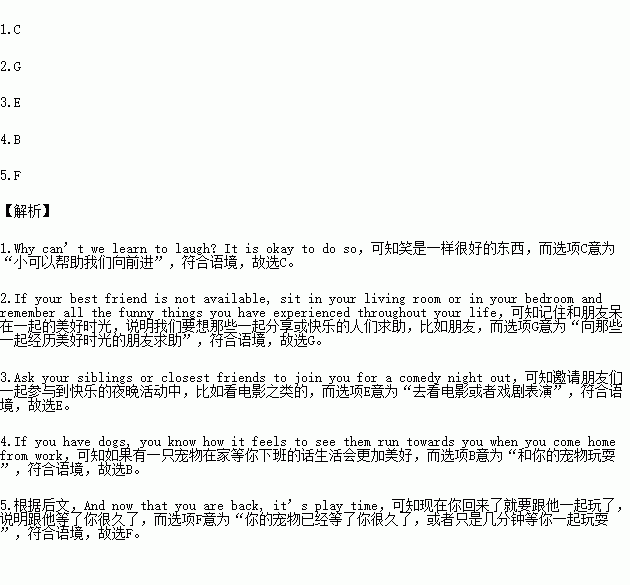题目内容
根据短文内容,从短文后的选项中选出能填入空白处的最佳选项,选项中有两项是多余的选项。
Laughing is the farthest from our minds when things are not going good. We consume ourselves in sadness, tears and anger. Laughter is healthy. 1. Why can’t we learn to laugh? It is okay to do so. Here are some ways to make that happen:
1. Call or visit your best friend
2. Reminisce(追忆) on funny times together and laugh a hearty la ugh. If your best friend is not available, sit in your living room or in your bedroom and remember all the funny things you have experienced throughout your life. Laugh as loud as you can.
ugh. If your best friend is not available, sit in your living room or in your bedroom and remember all the funny things you have experienced throughout your life. Laugh as loud as you can.
2. Surround yourself with positive people
Ask your siblings or closest friends to join you for a comedy night out. 3. If the movie or show turns out disappointing, don’t let that turn you down. Make some innocent fun about the movie or show. Your friends or siblings will join the conversation.
3. 4.
If you have dogs, you know how it feels to see them run towards you when you  come home from work. 5. And now that you are back, it’s play time. That will definitely put a smile on your face.
come home from work. 5. And now that you are back, it’s play time. That will definitely put a smile on your face.
Laughter does not reduce the pain you are experiencing. It lends a hand to deal with the tough times with a more positive outlook. Don't fear laughter. Embrace it.
A. Spend time with your children.
B. Play with your pets.
C. Laughter keeps us moving forward.
D. People love these pets and regard them as their good friends.
E. Head out to a movie or a comedy show.
F. Your friends have waited all day – or just a few minutes – for your return.
G. Turn to the person with whom you shared humorous moments with.
 名师导航单元期末冲刺100分系列答案
名师导航单元期末冲刺100分系列答案 名校名卷单元同步训练测试题系列答案
名校名卷单元同步训练测试题系列答案
